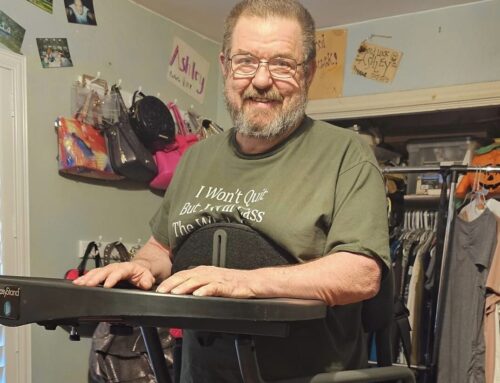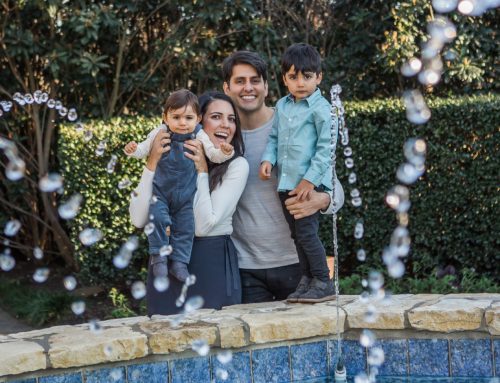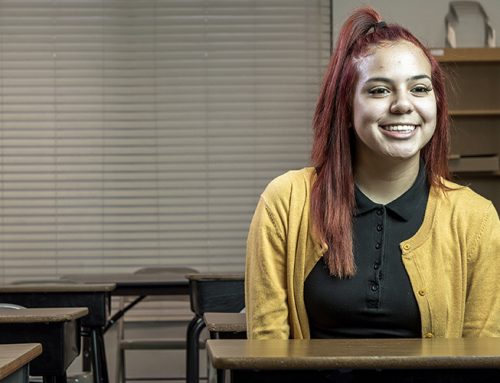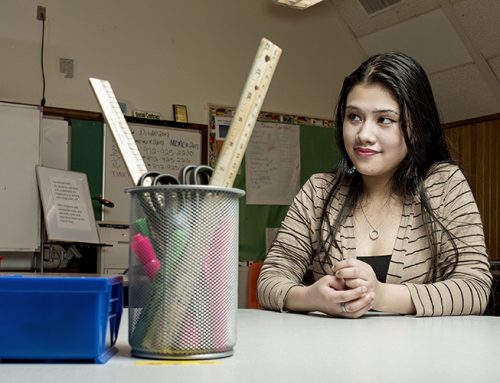Nothing is going to stop Woodrow Wilson High School senior Kadrian Oliver from going to college — not poverty, not academic setbacks and not a terrifying run-in with a gunman who assaulted her mother.
Kadrian’s mom, Alyce, recognized Kadrian’s potential from a young age. Kadrian started reading as a toddler and even then had a thirst for knowledge. Alyce tried to expose her to as much of it as possible because she wanted her to go to college to build a better life, but getting there hasn’t always been easy.
Alyce and Kadrian are very different. Alyce was a troublemaker when was in high school.
“I always wanted better, but I didn’t think it was really possible,” she says. “Life just happened around me — a lot of unloveliness. My career in high school was about being the baddest, looking good and making sure no one was going to mess me over. I excelled in science and math, but I didn’t do it.”
That was exactly what she didn’t want for Kadrian.
“I knew that something was possible, so I just packed in what I had in me, and I hid it in my child,” Alyce explains. “Kadrian got no toys. She got books. We’re talking the classics, the Bible, history.”
“Anatomy and physiology,” Kadrian adds.
“Literature. Everything in sight,” Alyce says. “I thought, ‘Hey, I can expose to her what I want her to see.’ I bought her the book, ‘Africana Woman,’ and that’s how I taught her black history.”
When Kadrian was growing up, their small family — Alyce, Kadrian and her brother, Khahari — bounced around the Dallas area and from school to school, usually due to financial hardships. At times Kadrian and Khahari went to good schools, and other times their schools were less than stellar, but Kadrian was determined not to let that stop her from learning. She continued to read and research.
In some ways Kadrian was a typical child. In seventh grade she was in karate, book club and she read a lot of Manga. In other ways she had a curiosity that went far beyond that of a typical 12 year old.
“I remember we had Japanese vocabulary tests in karate, and in my Manga books I would see author’s notes written in full Japanese and I wanted to know what it said,” she explains.
And just like that, she found a website with Japanese phonics and began to teach herself Japanese, which she did for several years.
At the same time she was learning about the power of belief and positive thinking.
“I was on this belief kick and what I wanted was mine, so I started going after it,” she says.
When Kadrian learned about the international educational foundation International Baccalaureate (IB), she immediately knew it was the ticket to a good college and she began searching for a school in Dallas that offered it.
The middle school she attended at the time wasn’t challenging enough. Knowing she wanted to be in an IB school, she pushed herself academically so she’d be prepared for a more rigorous workload.
That work paid off when she was accepted into Woodrow’s IB program to which she commuted from her home in South Dallas.
The school’s principal Kyle Richardson immediately saw her potential, and told her that if she worked hard enough, she’d be headed for a good college.
“He was the first person to tell Kadrian that she could graduate from Woodrow and go to one of the top 50 colleges,” Alyce recalls, tearing up at the memory.
Everything seemed to be falling into place. Kadrian remembers her first year at Woodrow as a celebratory one. She wanted to try everything — and she did. She made both the cheer team and the debate team. Although people warned her the IB program would be “too hard,” she wasn’t deterred. She excelled.
Then two years ago, the Oliver family’s perseverance was tested.
It was late August in 2014. The family was up before the sun because Kadrian had cheer practice. At the time they were living in South Dallas and were on their way to catch the bus. They stopped to enjoy the sight of the moon above them when they heard a voice across the street. Kadrian’s brother said good morning to the stranger.
Through the darkness, the stranger rushed toward them. They saw he was holding a gun.
First he demanded money. As Alyce searched for her wallet, the man threated Kadrian and her brother, pointing the gun at both of them, even grabbing Khahari by the hair. Khahari screamed, but Kadrian remained calm.
“I kept telling him, ‘Khahari, just calm down. Calm down. Everything is going to be OK.’ Visually I remember everything but the gun,” Kadrian says. “I remember exactly what the man looked like. I knew he had it, but I don’t remember seeing the gun ever.”
Alyce adds, “And yet when he pointed it at her, she leaned right into it. She made him so uncomfortable he couldn’t keep the gun on her.”
Alyce asked the man to let Kadrian and Khahari go back to the house, which he did. He made Alyce stay with him, but Kadrian and her brother walked home, dazed, and sat on the porch to wait for their mom.
The man raped Alyce at gunpoint in an alley and then released her. She ran home to her kids and they called the police. DNA analysis led to the eventual capture of Van Dralan Dixson, a serial rapist who terrorized South Dallas for more than two decades.
In April 2015 Dixson pled guilty to four counts of aggravated sexual assault and two counts of aggravated robbery, although police believe he was responsible for at least nine attacks.
The family was shaken, but Kadrian remained positive and helped her family do the same.
“Kadrian was in the spotlight about reminding us how to feel when things happened,” Alyce points out.
“Bad things happen and good things happen all the time,” Kadrian explains. “We try to look at things in the most positive way possible because we’ve experienced and learned that the way we look at things actually changes what they are and how they come to affect us.”
But they all still had to make the time and effort to deal with the emotional aftermath. Kadrian pulled away from debate.
“I didn’t want to get back into debate after that incident,” Kadrian explains. “With debate you become super critical and I didn’t want to feel any more anger or hate than I needed toward him.”
And cheer became a struggle as well. She wanted to do the best she could, but her family no longer left the house before daylight, which meant that she was often late to practice, so she dropped out.
“Sophomore year I kind of shut my classmates out,” she says. “It was just trying to feel good and focus on what was in me, to keep building on myself.”
“To keep going,” Alyce adds.
The IB program grew more difficult her junior year. Math and French came easily for her, but she struggled in chemistry, English and history. She questioned whether or not she should continue in IB.
“I was afraid to ask for help because I had been off the scene for a while,” Kadrian says. “… I thought I was incompetent and so I reacted by not doing anything.”
“She kept it from me,” Alyce points out. “I kept asking her how things were going and she told me, ‘Everything is great,’ every day.”
“Looking back, I don’t know what was so difficult,” Kadrian says, “but it was so difficult. I just couldn’t finish anything.”
She kept her head down and dedicated herself to her schoolwork. She found she was more motivated working in groups, so she returned to debate and joined the robotics team. Although she didn’t know any coding, robotics fascinated her.
“That felt good for me,” she says. “That was a part of me getting back into the groove of doing school. I made a lot of friends on that team.”
With the help of her teachers, she kept her grades up and pursued her dream of going to college by applying for University of Texas at Dallas and Temple University in Japan. It taught her three important lessons she can take with her to college:
“Take accountability, don’t be ashamed, be proud, and ask for help,” she says.





